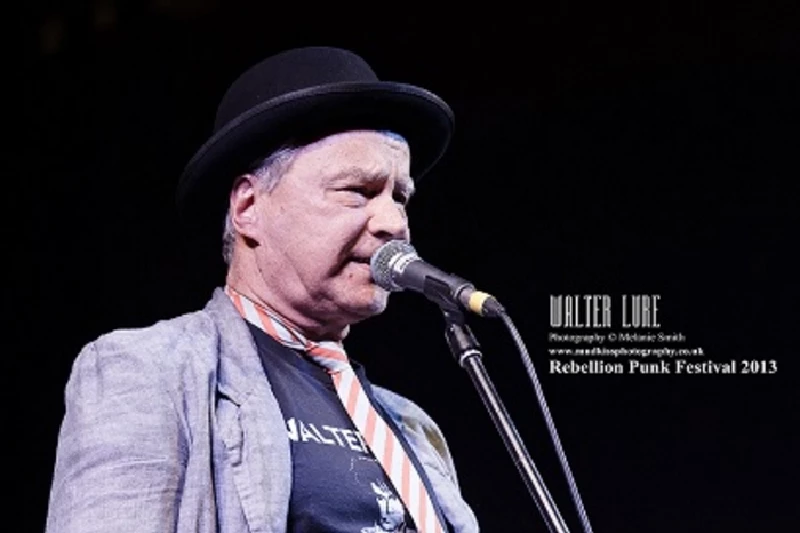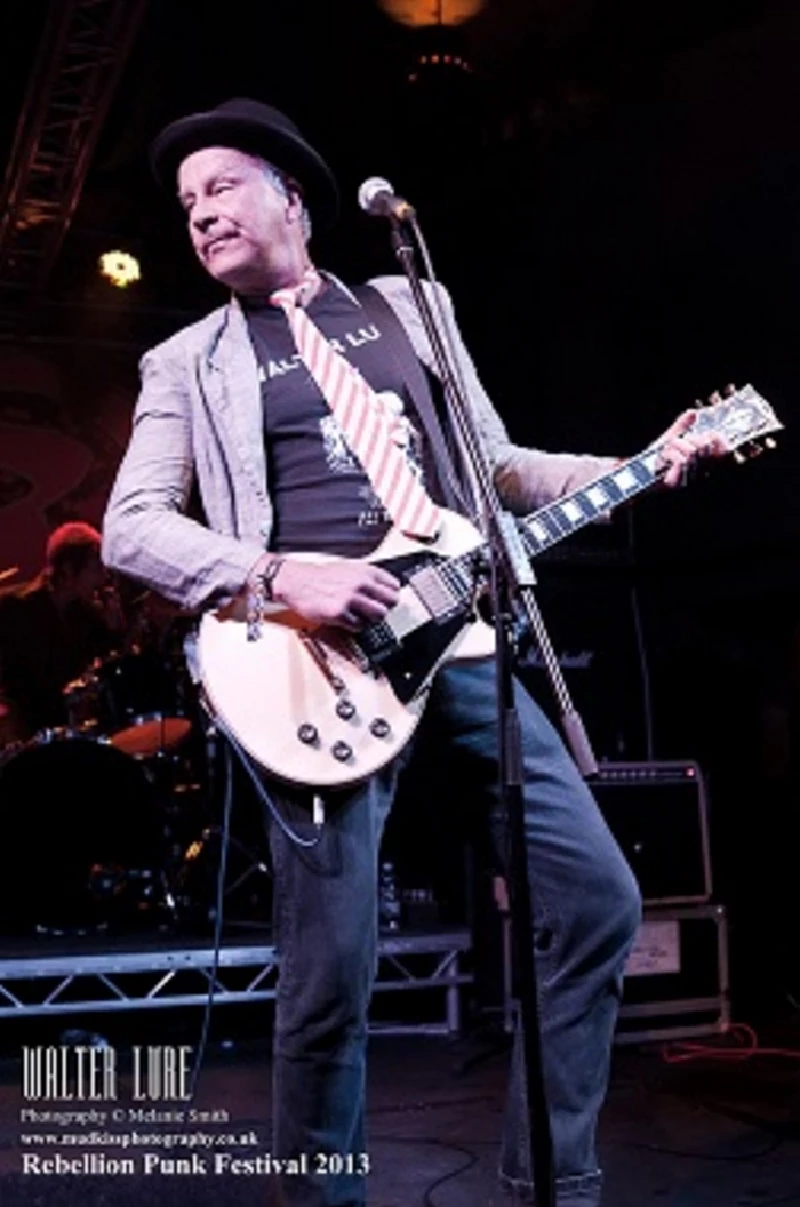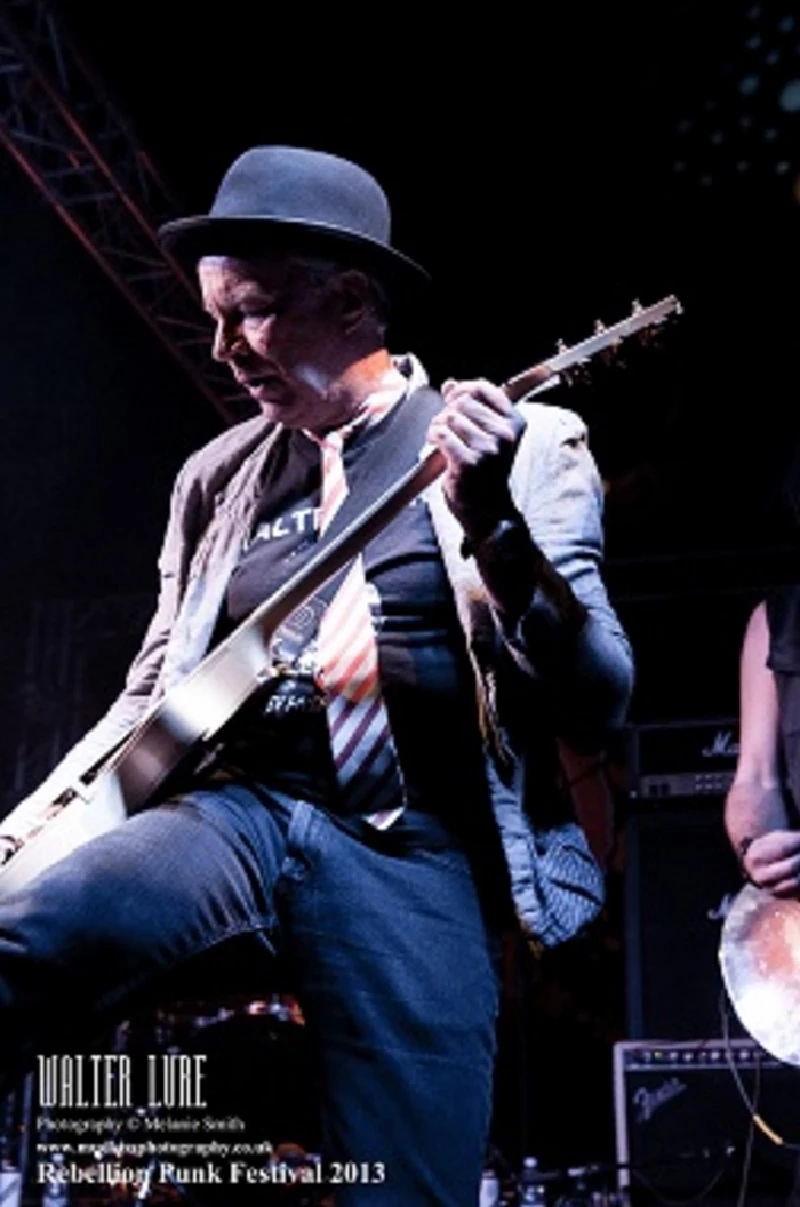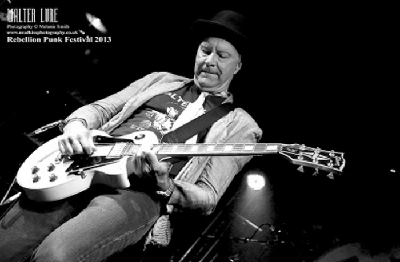Waldos - Interview Part 2
by John Clarkson
published: 15 / 1 / 2014

intro
...and in the second part his years with the ill-fated Heartbreakers, which also featured the New York Dolls' Johnny Thunders and Jerry Nolan
PB: Is it true that you had known Johnny Thunders and Jerry Nolan since the late 1960s? WL: I didn’t know Jerry, but I knew Johnny but from a distance. We never talked, but every concert I went to in my college years in the late 60’s I would always see Johnny there with his girlfriend. He always used to have the latest British clothes. It was the thing to do then, to dress like the British bands which basically everyone did, but John always stood out. We would always look at one another and acknowledge each other, but we would never say anything (Laughs). I stood there. He stood there. He would recognise me. I would recognise him, and every show that I went to he was there. I went to Woodstock and I saw him there. I saw him at all these other festivals like the Newport Jazz Festival and Atlantic City Rock Festival. Wherever I went I saw the guy, at the early show, the late show, at the Fillmore East. I just saw him. Then when I first saw the New York Dolls at the Mercer Arts Centre, there he was, this guy on stage that I had been banging into for years. I thought they were great from the first time I saw them, but then when Jerry joined they went from what I thought was being a cool local band to a professional group. Before Jerry joined and they had their first drummer Billy Murcia it was still good, but Jerry changed the whole tone to it. PB: You were in a band called the Demons before you were in the Heartbreakers. How did you go from them to joining the Heartbreakers? WL: The Demons shared a rehearsal studio with the Dolls because the Demons’ singer dealt dope and coke to the Dolls. So, that was the connection. That was how I got to know the Dolls. We then got word that Johnny and Jerry had both left the Dolls and they had broken up. Then at the first gig that I did with the Demons both Johnny and Jerry showed up, and after the show Johnny said to me, “Do you want to join a band?” and I said, “What’s going on?” and he said, “We are starting a new band.” I had heard that something was in the works, so I said, “Sure”, but they asked me to keep it a secret from the singer because he was a friend. So, I had to come to this audition about a week or two later. By this time they already had Richard Hell in the line-up. I went to this audition with the three of them, and I remember we did ‘Blank Generation’ and ‘I Wanna Be Loved’. Then after that I didn’t hear anything for a month or so. The Demons then had this gig with the Heartbreakers, the three-piece Heartbreakers who were playing their first gig across at this club in Queens. We played and then they played, and I was talking to Jerry after the show, and he said, “Don’t you like any of the Heartbreakers songs ?” and I said, “No, I love the songs,” and he said, “Does that mean you want to join the band?” And that was it. I started rehearsing with them. This must have been 1975, and so on a Friday night I played my last gig with the Demons. There was about twenty or thirty people in the audience. It was a bit lame and boring, very much a no name rock band show, and then the next night the first Heartbreakers gig with all four of us took place at CBGB’s on the 4th July. The place was packed to the walls and there was people screaming for us, and so I went from nowhere to being the biggest band on the scene overnight. PB: Richard Hell was in the Heartbreakers for about a year. There was an absolute clash of personalities from the outset. He was more of a poet than a musician and came at the band from an art rock background, while the rest of you were much more interested in being a rock and roll group. In hindsight, given the different schools of thought involved, do you think that it could have ever worked? WL: It was never going to work because Richard was trying to take over the band. He thought that he was the resident genius, and that that the band should do whatever he said. He had been in Television and written some really cool songs, but he was arrogant. As you say, he wasn’t rock and roll. He was a poet, and the only reason why he started playing music was that there was no outlet for a poet back then. He thought that he would use rock and roll music to put out his poems. When Johnny and Jerry left the New York Dolls, they needed a shot in the arm of new credibility. The punk scene was post-Dolls, and the Dolls weren’t really part of the punk scene even though they had been the parents to the punk scene. Having Hell in the band was really a great publicity coup because he had been in one of the pivotal punk bands. That really helped things in terms of image. I was brought in to flesh out the music. Johnny was great, but he couldn’t carry the band on his own. He was too gone. In the beginning it was fun, but Hell wanted to rule the roost and started to want to sing more and more of the songs. Finally it came to a head one night in rehearsal. Hell told John that he should only sing two songs and the rest should be sung by him, and I was only allowed to sing the one song. John walked out, and Jerry and I followed him. Hell was funny and he had good songs, but we weren’t going to put up with him being a dictator. We got Billy Rath in to replace him. The truth is that Hell didn’t have a good rock and roll band after that. He was never a rock and roller. PB: How did the songwriting in the band work after he left? If you look at the songwriting credits, it seems that you and Jerry wrote together quite a lot and Johnny used to work on his own? WL: Yeah, Jerry became a sort of songwriting chum for me. He had various songs such as ‘Can’t Keep My Eyes On You’ for which he had the music down, but he didn’t have a chorus or a verse. He just didn’t like writing words, so he let me finish them off for him whereas other songs like ‘One Track Mind’ and ‘Get Off the Phone’ were all mine. Then he said, “Why don’t we become a writing team like Lennon and McCartney or Jagger and Richards or something like that?” and I said, “Yeah, sure.” We weren’t going to make a million dollars, so I didn’t mind having my name on the writing credits with him. The only song we actually wrote together was ‘All by Myself'. We happened to find the beat in rehearsal before Johnny got there, and I came up with all the music. Then he sang the title in the chorus section, and I added the words to that. Other than that he would hand pieces to me sometimes and I would flesh them out for him, but we never worked together that much except for the odd thing in which I would finish something he had already started or fix his ideas. John would do stuff on his own. He would quite often come into rehearsal with a new song. He would show up and have the song mostly done, at least the music anyway, and most of those songs were at least initially quite good. Later on he would go on binges, do two or three days on coke or sulphate and write all these songs, and there might be half a one in there which was useable. PB: The Heartbreakers catalogue is relatively small. ‘L.A.M.F’ was your only studio album. Did you reject a lot of material for it or did you use pretty much everything that you had got? WL: At the time we used pretty much everything that we wrote. There were other songs that weren’t on there. Johnny brought into rehearsal some old blues tunes that we used to play live, and we did some old 50’s tunes like ‘Summertime Blues’ at gigs as well. Pretty much all the songs that we had self-written went on to ‘L.A.M.F’. There were a couple of songs from the Hell era for which Johnny had written the music and Hell the lyrics like ‘Hurt Me’ that we forgot about, but otherwise we used just about everything that we had got by that stage on it. PB: Why do you think that you wrote so little? Was it a case of simply writing less but more or was it because of other factors such as all the drug problems in the band? WL: We had the songs written, and we were looking to record a record. We almost signed a deal in New York, but then we got the call from Malcolm to do the ‘Anarchy’ tour and that changed everything. We got over there and we toured. We also moved from New York to London because it was a much healthier scene over there. Then we signed a deal with Track Records and were recording ‘L.A.M.F.’, and, of course, that recording took fucking forever. It started in February ’77 and lasted until late summer/early Fall. We had to keep going back into the studios, and we were touring as well over there using the songs that we were going to record on the record. We didn’t really have the time to have rehearsals and to come up with new songs. We would have the odd rehearsal now and then between shows, and came up with ‘London Boys’, ‘Dead or Alive’ and ‘Too Much Junkie Business‘ at those, but that was only a short period in which we weren’t distracted getting the record recorded and touring. Once the record was out, we also had to tour some more, and then Johnny decided towards the end of 1977 to go solo and we were back to square one as regards doing anything creative. That pretty much killed things anyway. Track Records also folded at about the same time. PB: You arrived in Britain on the same day that the Sex Pistols made their appearance on London television with Bill Grundy. You were due to play all these gigs with them and the Clash and the Damned on the ‘Anarchy Tour’ across Britain, but they all ended up getting cancelled at the last minute. Was that a cause of frustration to you or did you simply see it as good publicity? WL: Well, for me it was fun. It was frustrating at one level as we would get to a town and find out a show was cancelled and have to sit around in the hotel, but it was cool at another because I got to know all the guys in the Clash and we would sit up all night drinking. The publicity was also incredible. The press was always hanging around no matter where we were and you couldn’t buy that kind of publicity, even if you had the Bank of England supporting that show. It was great for that, and the notoriety and just being part of the whole scene. There were twenty-six shows, and I think we played six, and half the shows were put together at the last minute by whichever venue was willing to put us out there. About 99% percent of the original shows were cancelled, and the other ones were just stapled together. To me I was just along for the ride. I was working at the time as a chemist in New York for the US Food and Drug Administration, testing foods and drugs for impurities. I had taken a month off my job to do the tour. I really enjoyed it. It was cool meeting everyone, plus the whole scene was a breath of fresh air. It was ten times better than the New York scene. PB: How did you get on with the Sex Pistols? WL: I got on great. Even Rotten would be great if you had him on his own or with his band or late at night. He would be fine, but he would always turn into an idiot if strangers were with him or press or anyone that didn’t know who he was. He started to act like his persona and was just a jerk. He was fine on his own, but as soon as anyone walked in he had to act like Johnny Rotten as opposed to John Lydon. We got along fine with him though. PB: You are touring sporadically with the Waldos again. Is there ever liable to be a second album? WL: I would love there to be. People have been beating on my head for years about it, saying, “Get on with it. Write some songs.” I actually got to around to doing some recording in my house with some of the Waldos people, and the guys were all saying that there is some dream songs there, but I haven’t got around to finishing them off. The songs haven’t got titles, and I haven’t finished certain lyrics. As I work full-time now, I don’t really spend a lot of time playing like I used to. The band that I have in New York doesn’t really rehearse all that much. One of the guys works all night at a Japanese television station, and the other guys all have day jobs. Maybe I should have put more pressure on them, but it didn’t seem fair. With the line-up that did ‘Rent Party’ we would rehearse once a week. It would go on late into the night, and I would just go to work the next day a little bleary-eyed but we came up with a lot of stuff. I also hate doing things during the week now as well. More often than not I can’t be bothered staying out at night and rehearsing. I would eventually love though like to make a second album. It has been twenty years now. PB: Thank you. Photos by Melanie Smith www.mudkissphotography.co.uk
Band Links:-
https://www.facebook.com/theWALDOSPicture Gallery:-


interviews |
|
Interview Part 1 (2014) |

|
| Walter Lure was the punk guitarist with both his own band the Waldos and also 70's legends the Heartbreakers. In the first part of a two part interview he talks about the reissue of the Waldos' only album 'Rent Party'... |
most viewed articles
current edition
Carl Ewens - David Bowie 1964 to 1982 On Track: Every Album, Every SongArmory Show - Interview with Richard Jobson
John McKay - Interview
Colin Blunstone - Thalia Hall, Chicago, 16/7/2025
Billie Eilish - O2 Arena, London, 10/7/2025
Bathers - Photoscapes 1
Visor Fest - Valencia, Spain, 26/9/2025...27/9/2025
Loft - Interview
Sir Tim Rice - Interview
Robert Forster - Interview
previous editions
Manic Street Preachers - (Gig of a Lifetime) Millennium Stadium, Cardiff, December 1999Heavenly - P.U.N.K. Girl EP
Beautiful South - Ten Songs That Made Me Love...
Oasis - Oasis, Earl's Court, London, 1995
Peter Perrett - In Dreams Begin Responsibilities Interview Part One
Boomtown Rats - Ten Songs That Made Me Love....
Prolapse - Interview
Coldplay - Wembley Arena. London, 16/8/2022
Pixies - Ten Songs That Made Me Love...
Trudie Myerscough-Harris - Interview
most viewed reviews
current edition
Davey Woodward - Mumbo in the JumboSick Man of Europe - The Sick Man of Europe
Lucy Spraggan - Other Sides of the Moon
Amy Macdonald - Is This What You've Been Waiting For?
Phew, Erika Kobayashi,, Dieter Moebius - Radium Girls
Bush - I Beat Loneliness
Suzanne Vega - Flying With Angels
Alice Cooper - The Revenge of Alice Cooper
Blueboy - 2
Cynthia Erivo - I Forgive You
Pennyblackmusic Regular Contributors
Adrian Janes
Amanda J. Window
Andrew Twambley
Anthony Dhanendran
Benjamin Howarth
Cila Warncke
Daniel Cressey
Darren Aston
Dastardly
Dave Goodwin
Denzil Watson
Dominic B. Simpson
Eoghan Lyng
Fiona Hutchings
Harry Sherriff
Helen Tipping
Jamie Rowland
John Clarkson
Julie Cruickshank
Kimberly Bright
Lisa Torem
Maarten Schiethart